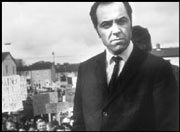BLOODY SUNDAY
written and directed by Paul Greengrass
opens Oct. 25 at Uptown
WE BARELY KNOW what to do with our nation’s own checkered history. How then to make sense of the grudges, grievances, passions, and hurts of Ireland? And the atrocities? Jan. 30, 1972, is a date fixed in the memory of that long-divided country, a day when 13 civil-rights marchers in occupied Northern Ireland were killed by British paratroopers. You’ve heard the U2 song (though perhaps without first grasping the lyrics’ significance), and that anthem does finally run over the end credits of this wrenchingly powerful drama.
Made by an English documentarian, Paul Greengrass, Bloody Sunday unsurprisingly feels a lot like a documentary, with history as script. You could say that its subject is how historical watersheds are made—by accident, inertia, misunderstanding, malice, altruism, anger . . . the full range of human behavior, in other words. Cultural and religious differences drive the marchers against the unyielding Protestant government and impel the British military’s response.
The tragedy of Derry (or Londonderry, as it’s known to Unionists), and the lesson of Sunday, is that no one seems to have a choice. In a disorienting whirlwind of editing that spans 24 hours, Sunday introduces four key players and perhaps 40 recognizable faces, but it’s a film without heroes. No one man or woman can seem to make a decision that affects the inevitable outcome. Humanity dissolves into the mob.
At first, the idealistic march organizer, Ivan Cooper (James Nesbitt), rides the chaos with a politician’s glad-handing assurance. A Protestant member of Parliament, he tries to exclude the hotheads and invite the respectable moderates to his rally. He’s a conciliator, not a radical. Martin Luther King is his hero; his followers dutifully sing “We Shall Overcome.” At the edge of the forming mass is 17-year-old Gerry, who wouldn’t mind chucking a few rocks at the “paras” but would rather be snogging with his girlfriend. Then there’s some I.R.A. guy in a car ominously surveying the scene.
On the other side of the wall (literally— Sunday is a film all about walls topped with razor wire and broken glass), hard-ass British Maj. Gen. Ford has flown in to supervise the local troops. Under him, the sympathetic Brig. MacLellan has doubts about deploying the paras accustomed to Belfast street warfare. Yet the official mood is clear: “We’ve got to teach these people a lesson.” The soldiers revile Irish “hooligans,” although one radioman quietly resists such talk.
IT’S ALMOST IMPOSSIBLE to keep track of names and identities—other than Cooper’s—in Sunday‘s murky matter-of-fact montage. Scenes begin and end abruptly, usually punctuated by fade-outs. Greengrass sticks to the chronology of the well-chronicled day with minimal embellishment. This happens, and then that happens, until events take on their own terrible logic.
Shots are fired, and rubber bullets are returned. Then, suddenly, live ammo turns white shirts red. Shrieking and panic erupts. More firing. More confusion.
It’s sickening, like watching a newsreel of the Hindenburg; the ship is going down. Cooper is powerless; MacLellan is powerless; even, you feel, the paras are in some sense powerless. To please their superiors (radio communication has failed), they’re squeezing off shots at presumed adversaries who look and dress just like anyone else cowering for cover. How do you tell the difference? It’s like Vietnam. Or the West Bank. Or Iraq.
The subsequent British cover-up is a given, and Sunday‘s minute-by-minute account follows the 1997 book Eyewitness Bloody Sunday in its refutation of the whitewash. Like South Africa’s Truth and Reconciliation Commission, the U.K. today is undergoing a kind of historical cleansing, a purging of the official lies. Some even talk of peace in Ireland, a healing of the old wounds. Yet Sunday is essential viewing because it shows how those wounds were inflicted in the first place. Mutual incomprehension, if not outright hatred, first strips the individual of his name and face; only then, as Orwell and others have observed, can political violence be directed at the anonymous group.









